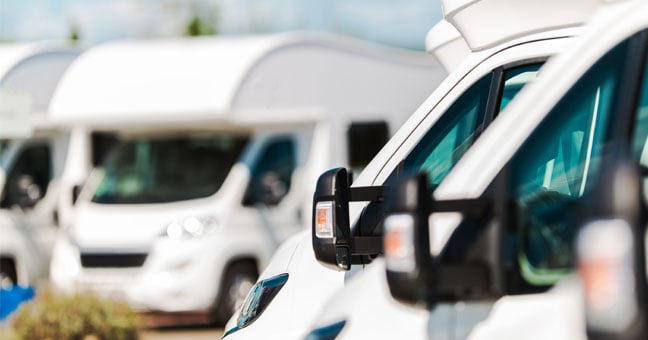

Jan 18 2022
Having trouble decoding Recreational Vehicle (RV) VINs, or not obtaining as much information from the VIN as you’d hoped? You are not alone. RV VINs, particularly for motorhomes, are some of the most challenging to decode.
There are a few prominent reasons why RV VINs are more challenging to decode than a standard vehicle VIN, including the way they are built, the level of customization, and the lack of VIN standardization (for motorhomes).
Here are some details to help better understand what you’re up against when identifying these complicated vehicles and what you can expect when decoding the various types of RVs.
In order to fully understand the challenges of decoding RV VINs, it’s important to have a good understanding of the types of RVs available and how they are built.
RVs fall under two main categories, drivable (motorhomes) or towable:
Drivable RVs, more commonly known as motorhomes, are typically built in two stages by two separate manufacturers; the chassis/cutaway manufacturer and the motorhome manufacturer. Here are the different types of motorhomes:
Class A motorhomes are the largest and are built on a specifically designed medium or heavy-duty coach chassis, such as the Freightliner XC series. These chassis are supplied bare from the chassis manufacturer, along with the powertrain. The motorhome manufacturer builds the living area, driving area, and storage bays, making it look uniform. There are some exceptions (mentioned later in the article) where the motorhome manufacturer will build from the ground up.
Class B motorhomes are the smallest and are typically built on incomplete van or transit cutaway/cab chassis, such as the Ford Transit Cutaway or Mercedes Benz Sprinter Cab Chassis. While both the chassis and the cab are manufactured by a third party (Ford, Chevrolet, Mercedes, etc.) the motorhome manufacturers do a good job making the body look uniform.
Class C motorhomes sit somewhere in the middle of Class A and B motorhomes in size. These motorhomes are usually built on a van cutaway chassis, or truck cutaway for “Super C” RVs and look more like a multi-stage RV than the other classes, especially when they include a cab-over.
Towable RVs are built by one manufacturer given that they do not have all the complex driving components, such as the chassis and powertrain. Some of the most common towable RVs include fifth-wheel trailers, toy haulers, travel trailers, teardrop campers, tiny trailers, hybrid travel trailers, and pop-up trailers.
Given that motorhomes are typically built in two stages by two separate manufacturers, they may have multiple identification codes. The first code would be the VIN assigned by the chassis manufacturer (the “incomplete vehicle manufacturer”) and any other codes would be assigned by the RV manufacturer (the “completed vehicle manufacturer”). While the chassis manufacturer follows the NHTSA 17-digit VIN standard, there is more leeway for the RV manufacturers. There are a few different ways RV manufacturers will handle the identification of their complete vehicles:
More often than not, the VIN provided on a multi-stage motorhome listing is for the chassis. Decoding that VIN will return details about the chassis and not the finished motorhome. The motorhome details you’re probably looking to identify, such as the RV make, model, floor plan, number of slide-ins, etc., are particularly difficult to decode. In many cases, this information cannot be identified by VIN alone without obtaining additional data directly from the manufacturer.
Even though most motorhomes are built in two stages, there are a handful of manufacturers that build or have built, their motorhome model lineups or specific models from the ground up, except for the powertrain. Some of these include WRV (Alpine Coach), Foretravel, Newell, Monaco (Roadmaster), Tiffin, Country Coach, Prevost, and American Coach. In these cases, the VIN would decode down to the RV manufacturer rather than a 3rd party chassis manufacturer.
Unfortunately, even though single-stage motorhomes only have one VIN, it’s still not much easier to decode. Sure, you can accurately identify the RV manufacturer and model year by VIN, however, all other information encoded in that VIN can still vary from manufacturer to manufacturer and will likely still require additional data from the manufacturer to identify serial-level data.
Towable RVs are all built in one stage, therefore, only one VIN is assigned, which follows the NHTSA standards. These VINs will encode a bit more information about the RV, including some of the following details: year, make, trailer attachment, trailer type, length, axles, and production plant. However, the floorplan and other model-specific details are still not available without leveraging additional data from the manufacturer.
Both towable and drivable RVs offer a great deal of customization which will never be captured in the VIN number, unfortunately. This information would need to be obtained from the RV documentation.
RV VIN decoding is, well, challenging! While your business may find value from leveraging an RV VIN decoding solution, there are several data points that cannot be obtained by VIN alone. If your business requires more than basic data (year, make, model, trailer type, etc.), you’ll need to leverage an additional data source.
If your business does have a need for decoding some of the core data mentioned for towable RVs or the chassis information for motorhomes, DataOne’s VIN decoding solution may be a good fit. Please reach out with your business’s RV VIN decoding needs!